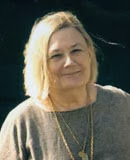About Me

- Anita Burgh
- I am a writer - late developer since I wasn't published until I was 50. I have now written 23 novels, numerous short stories and articles.
Followers
Blog Archive
My Blog List
Powered by Blogger.
Slideshow
Sunday, 27 September 2009
Mary Jon and Jo asked how: “How do you get into the next book?
Is it just a matter of writing more to get into it?”
I have to say I’ve never had any problem with this. Often my publishers would ask me if I cared to write a book about a certain subject, Clare’s War is one and On Call another. If I liked their ideas then I would do them, but I was once asked if I would write about horse racing and I turned it down since it was not something I was interested in.
Otherwise, what usually happens is that about 2/3rds through a novel a theme for the next one comes chuffing in – I liken them to trains arriving and leaving stations, I even visualise them as such; honestly, if you pause and think about it, we writers do have the oddest minds. I wonder if our brains are wired differently?
While finishing the work in hand I can’t afford to concentrate on this new one, but if odd ideas come I will make a note of them – you think you’ll remember but you never do. But subconsciously it is bubbling away and building.
One book finished and the new adventure begins. But for me this cannot begin until I have a character – not necessarily a main one – to start with. I liken it to waiting for a blind date to come along.
My advice to my YUPs (yet unpublished) is don’t worry too much about the beginning getting the story down is more important, for often, with me, the beginning changes sometimes several times. And, don’t forget something else, your style, if new, will change too. You will be a better writer at the end than you were when you set out.
Now, presenting this idea of yours, written or not, to the publisher is always a tricky problem no matter how many books you’ve had published. You’ve got to enthuse them too. So, how? The blurb (A synopsis tells and a blurb sells – should be written over every writers desk!) If you spend days making it up then that is time well spent. You use it to sell, you use it to interest editors you meet.
The Romantic Novelists Association parties are, I sometimes think, akin to speed dating – you have a few seconds to grab the attention of publishers and agents who attend. Like other people’s dreams nothing is more flat than gabbling the plot of a novel. But a pithy blurb? With it you encapsulate the book, excite the listener and hopefully hear those words, “I’d like to read the 1st three chaps, please send . . .’ That dream of all my YUPs. And then, when accepted, marketing bless you for that brilliant, short, succinct few words of yours for they will be used in publicity and go on the cover. Nothing wasted, time SO well spent.
e.g. Money, spite, jealousy and a noble Edwardian family is destroyed.
There is the theme, the status, the period and the consequence.
"Is it a case of writing more?" Mary Jon and Jo asked. Well, no, it isn’t. For every time the start of a new novel has always been a time of intense excitement. I’d go as far as to say that if I didn’t feel that I would give up.
There is a danger with next books and that is too many ideas floating around. Imo, one of the first things a writer should learn, is to control these ideas. Learn to put a lid on them and file them away.
Synopsis and blurb deserve blogs of their own I think, so I’ll do them next, I’ve no time now I’m so immersed in the book I’m writing.
Subscribe to:
Post Comments
(Atom)






Oh, I think writers' minds are DEFINITELY wired differently. My books are like boats in a harbour. I can see them all stoodging around in the bay and some of them look really, really interesting, but there's only room for one of them to tie up at the main quay!
ReplyDeleteSomething about this blog along with an earlier post regarding research has made a light bulb go off. For my first, well only, novel, I thought a lot the first few months - about the characters, the setting, the problems. I'd made notes as necessary, but I definitely spent more time initially thinking about the story than writing. For me, that worked. This post made me realize that I'd forgotten that. I'm trying to hurry up and write without giving my mind time to think and create. What a wonderful
ReplyDeleterealization! Thanks!